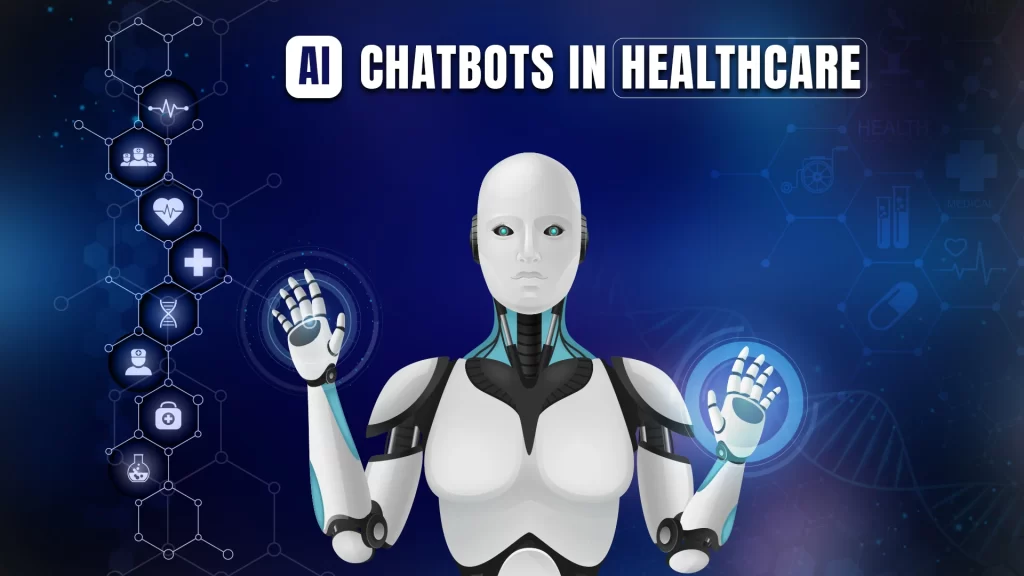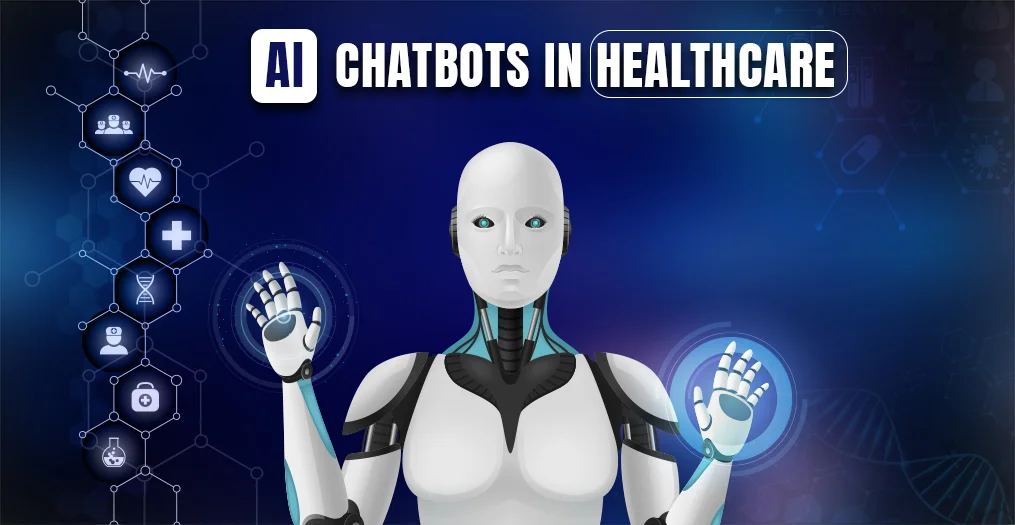AI Chatbots in Healthcare
AI Chatbots in Healthcare
An AI-powered chatbot is a trustworthy option for patients looking to comprehend the reason for their symptoms. Further, bots assist healthcare providers in decreasing their caseloads. That’s why healthcare chatbot use cases grow day by day.

Chatbots in Healthcare define Artificial Intelligence technology in the healthcare sector. They are conversationalists that drive the principle of deep learning and growth with Artificial Intelligence innovation. Along with using in communication, they also perform repetitive tasks like providing an answer, sending messages, marketing, generating leads, product analysis, etc.Chatbots are useful in the healthcare sector by automating all the repeated and inferior-level functions of a medical employee.
They gather and store patient information, ensure it’s encoded, help observe patients, provide informational support, and ascertain medical assistance is on a larger scope.In the healthcare industry, it is encountering quick changes and improvements in technology consistently. Artificial intelligence (AI), Neuro-Symbolic AI, Natural Language Processing (NLP), Machine Learning and Robotics Process Automation (RPA) are only a few technologies making their approach to hospital systems, research labs, and medical practices.
Nowadays, virtual authority and AI-enabled conversational chatbots have taken the middle stage, popping up in clinics, labs, drugstores, and even nursing homes. In the era of digital user experience, users expect quick and useful interactions. A broad study by Verified Market Research displayed that the healthcare chatbot’s market size is presently worthed at USD 194.85 Million in 2021 and is expected to reach USD 943.64 Million by 2030, increasing at a CAGR of 19.16% from 2022 to 2030.
Max Healthcare, one of India’s hugest hospital networks, used this kind of patient-targeted automation to mitigate the claims and billing process. Through RPA-powered AI chatbots, Max Healthcare was able to automate the manual claims procedure completely. For both management and patients, a tedious procedure was automated and modernized.Through these robots, Max Healthcare could reduce reversal time by 50% and store up to 75% of the time taken to handle health project information. It has also enhanced security and compliance while increasing user experience. By robotizing a burdensome, frustrating, and tedious procedure for patients, Max Healthcare developed quicker and more direct outcomes.
Benefits of Chatbots in Healthcare
Chatbots in healthcare can offer several benefits, including:
- 24/7 Availability: Chatbots can provide patients and healthcare providers with round-the-clock access to information and support.
- Improved Access to Information:Chatbots can offer fast and simple access to health data and resources.
- Increased Efficiency: Chatbots can automate routine tasks, decreasing workload and increasing efficiency for healthcare providers.
- Personalized Care: Chatbots can use patient information to provide tailored health recommendations and advice.
- Increased Patient Engagement: Chatbots can help patients stay informed and engaged in their care by giving reminders and support.
- Cost-effectiveness: Chatbots can reduce healthcare costs by automating tasks and reducing human staff requirements.
- Improved Communication: Chatbots can facilitate communication between patients and healthcare providers, leading to better care consideration.
Use Cases of Chatbots in Healthcare
Healthcare chatbots have several potential use cases, which are as follows:
Symptom Checker: A chatbot can provide patients with quick and easy access to health information and resources, helping them determine the severity of their symptoms and the best course of action.
Appointment Scheduling: A chatbot can assist patients in scheduling appointments and provide them with reminders and updates.
Medical information: Chatbot algorithms are trained on a huge amount of healthcare information, such as disease problems, syndromes, markers, and available treatments. Public datasets are utilized for training chatbots, like COVIDx for COVID-19 diagnosis and Wisconsin Breast Cancer Diagnosis (WBCD). Conversational chatbots with multiple smart levels can comprehend the customer’s question and give solutions based on accurate labels in the training information.
Handle insurance inquiries: Chatbots can give insurance services and healthcare systems to patients and insurance scheme representatives. Furthermore, incorporating RPA or different automation solutions with chatbots enables robotizing insurance claims processing and healthcare billing.
Virtual Triage: A chatbot can assist patients in assessing the urgency of their symptoms and guide them on the best course of action, such as seeking medical attention or self-care.
Post-Discharge Care: A chatbot can assist patients with post-discharge care, providing reminders, education, and support to help them recover and avoid complications.
Prescription Refills: A chatbot can help patients manage their medication by handling prescription refills and providing reminders to take their medicine.
AI chatbots in healthcare are rapidly gaining popularity as a tool for delivering convenient, personalized, and efficient healthcare services to patients. They can automate routine tasks, improve patient engagement, and provide real-time support to medical professionals. Despite these benefits, the use of AI chatbots in healthcare also raises important ethical and privacy concerns that must be addressed to ensure the responsible use of these technologies. Overall, AI chatbots hold great promise for transforming healthcare, and continued investment in research and development is crucial to realizing their full potential.

